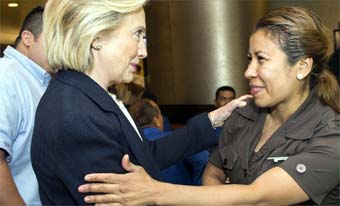
FBI Recovering Clinton Emails
| published September 23, 2015 |
By Keith H. Roberts, Thursday Review staff
According to Bloomberg and other media sources this week, the FBI has begun the process of recovering emails from the server which Hillary Clinton used while Secretary of State. Some inside the FBI are telling reporters that forensic computer experts have already recovered some emails, and expect to recover the rest within days.
The recovered emails will include some 30,000 which Clinton said she deleted, and the FBI and other investigative groups—though not officially charging anyone with a crime—are looking into the question of whether classified documents or top secret materials were mishandled through the use of that server and a private email account.
While serving as Secretary of State, instead of using a government-issued and maintained email address, Clinton used a privately-crafted email account and a homebuilt server. The server was housed for part of that time in the Clinton’s private home in Chappaqua, New York. For another stretch of time the server was housed at Platte River Networks, a small tech firm located in Denver.
The server had previously been thought to have been “wiped,” a process whereby its digital contents are effectively and completely removed. Wiping is typically done when a computer or server is being retired, donated, sold, or being passed along to someone else. In the case of Clinton’s server, reporters have been asking whether the contents were deliberately wiped clean to cover a paper trail of mishandled documents. Republicans in Congress want to know if the deleted information contains messages or documents relevant to an ongoing investigation into the militant attacks on the U.S. consulate in Benghazi, Libya—an attack which left several Americans dead.
But Platte River Networks says that as far as its records show, its employees were not asked to wipe the server, nor does the company have any information showing that the server was tampered with during the time it was housed in Denver. Platte River was so small during the early days of the firm’s existence that for a brief period the Clinton server was rack-mounted in a shelving unit in a bathroom. Platte River has since grown much larger, and had moved to newer, bigger office space.
The server was turned over to the FBI for analysis early last month.
Clinton’s use of the private email account and the non-government-issue server has been a growing problem for Clinton’s presidential campaign. At issue is whether Clinton circumvented federal requirements that all government employees use a government-issued email address, using servers and mainframes operated by federal security and IT specialists. According to the Federal Records Act, government officials are required to maintain their correspondence according to standards set under the provisions of the law.
The case grew more complex when the issue of the server came to light in the spring, at which time the FBI and other federal investigative agencies stepped-in out of concern for whether the strict guidelines regarding secret and classified materials had been violated, and whether or not the unsecured server might have come under cyber-attack by outside parties.
Clinton says she used the private email address only as a matter of convenience, though she now readily admits that it was a mistake. Spokespersons for the Clinton campaign say that Clinton has violated no laws, but rarely address directly the concerns over Clinton’s circumvention of the Federal Records Act, nor her apparent disregard for the security of the server.
Republicans say that Clinton used the private email account and the off-site server as an obvious tool to avoid transparency and accountability for her actions during her tenure as the top U.S. diplomat.
Weeks ago, after her campaign had suffered severe damage in polling in New Hampshire and Iowa, Clinton offered an apology for the fiasco. But she has insisted that at no time did she violate federal law, nor did she send or receive classified materials or top secret communications using the email account. An Inspector General’s audit of a random sampling of Clinton emails showed that between two and four emails—out of about 80 examined—contained information or data considered classified, though the State Department disputed the IG’s report. CIA officials later confirmed the IG’s conclusions that at least two, possibly four, of the emails examined did include classified material, though Clinton maintains that the communications were not classified at the time.
Of Clinton’s approximately 64,000 emails, some 31,000 were preserved by the State Department. Clinton acknowledges deleting roughly 30,000 which she deemed personal. Other Clinton employees may have also participated in deleting emails, though one—former top Clinton aide Bryan Pagliano—though his attorney has said he will not testify in any of the investigations regarding Clinton’s emails. While working as a Clinton staffer at the State Department, Pagliano was paid approximately $5,000 by the Clinton’s to maintain the server and the email account.
Related Thursday Review articles:
Clinton Server May Yield Deleted Emails; Thursday Review; September 13, 2015.
Clinton Paid State Department Staffer to Maintain Server; Thursday Review; September 6, 2015.
